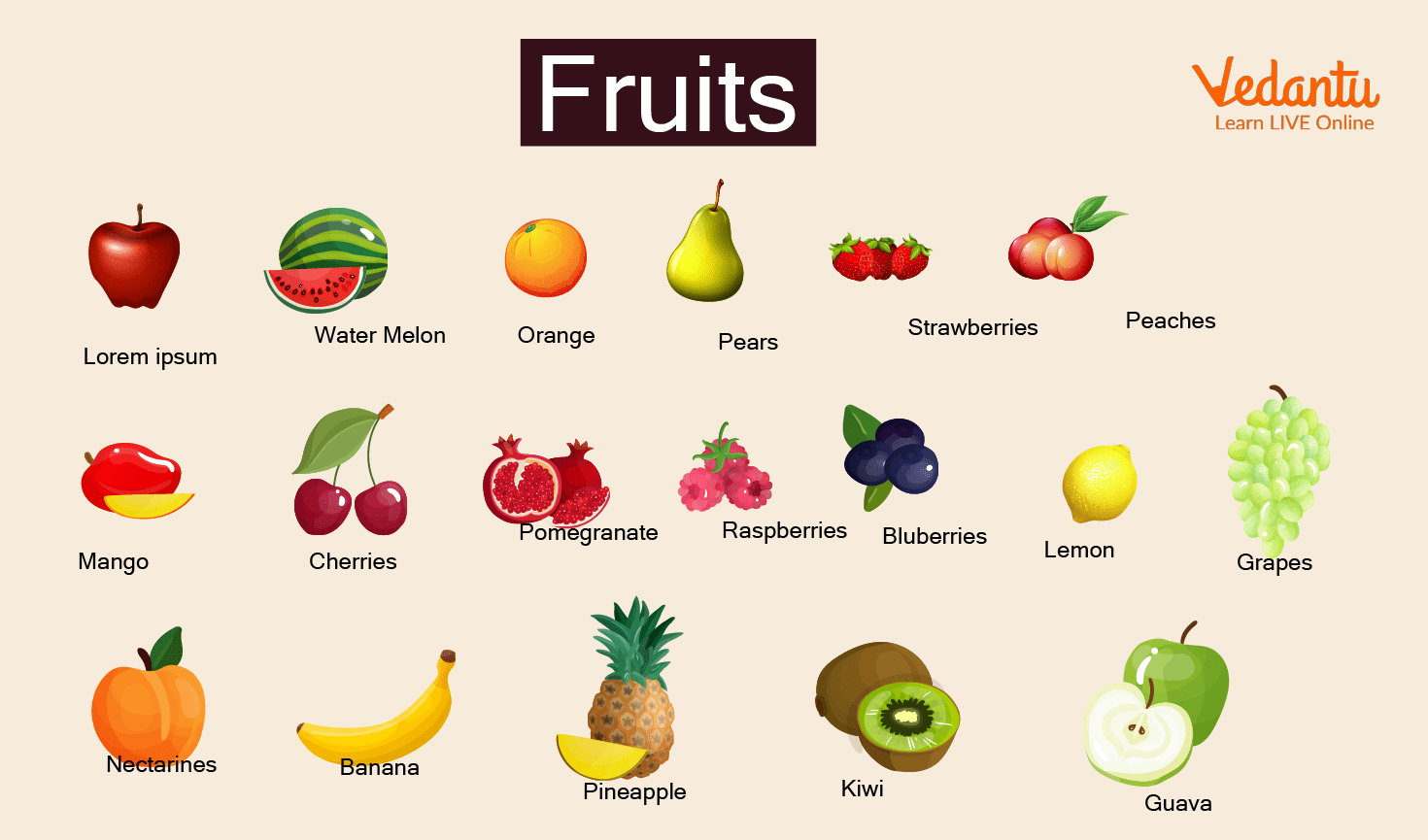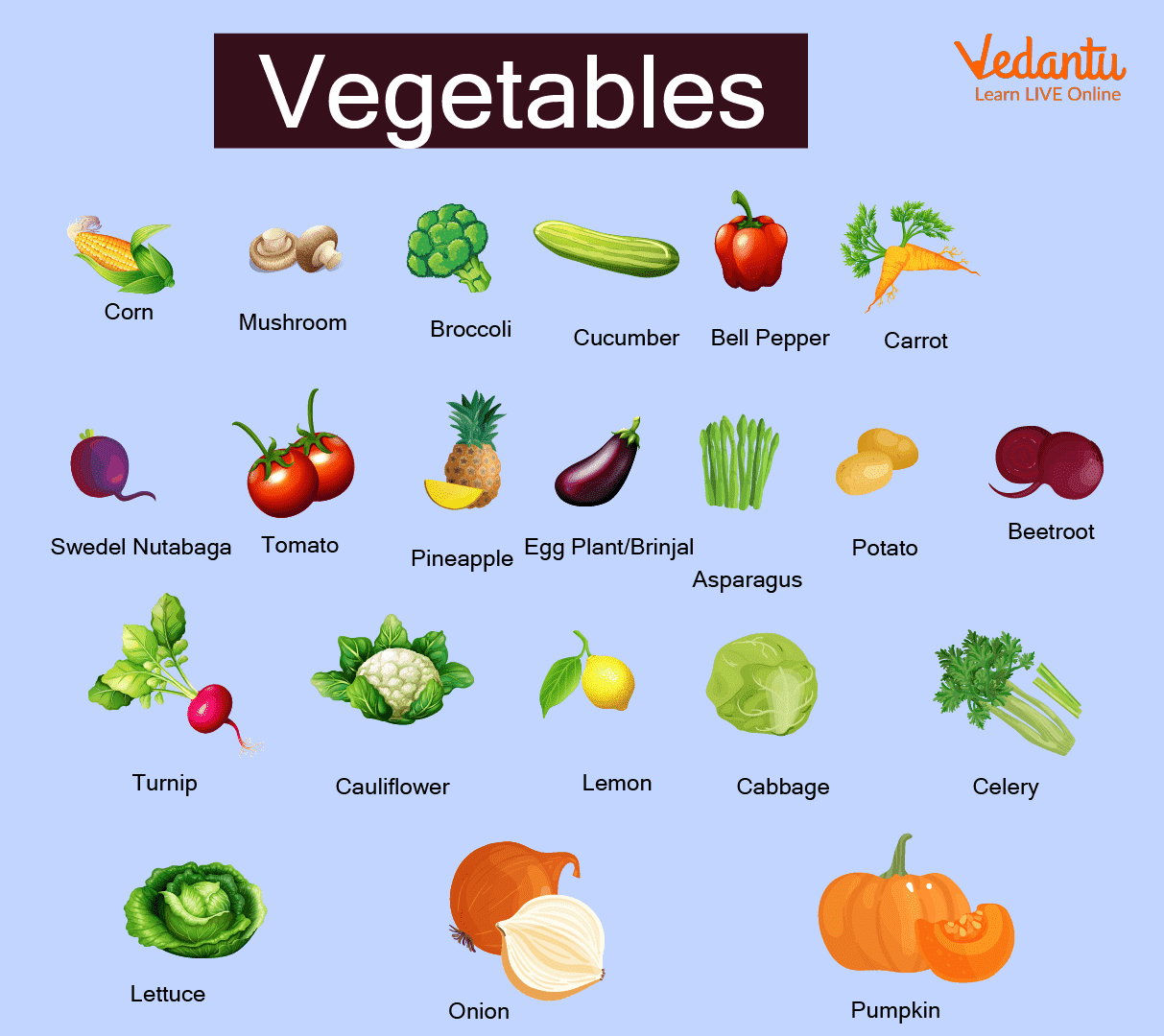




Why Learn Vegetable and Fruit Names? Key Benefits for Young Learners
A healthy diet should include plenty of fruits and vegetables, but diversity is just as important as quantity. All the nutrients you need for good health cannot be obtained from just one fruit or vegetable. This article provides names and basic information about different fruits and vegetables with the benefits of consuming fruits and vegetables in our diet. Even though there are numerous varieties of fruits and vegetables, knowing just a couple a day will significantly expand your vocabulary.
Fruits
They say, "an apple a day keeps the doctor away."
Health care providers are aware that fruit is a delightful, incredibly nutrient-dense, and practical supplement to any diet. You might be unsure about which fruit to choose because there are more than 2,000 types available. Each variety of fruit offers a special combination of nutrients and health advantages.
What are Fruits?
The tissue that holds seeds in flowering plants that develop from the ovary is called a fruit. Fruits are crucial components of a balanced diet and a good source of several essential nutrients, such as potassium, folic acid, and antioxidants like polyphenols. Fruits are known for their ability to prevent vitamin C and vitamin A deficiencies and are a strong source of vitamins and minerals.
Names of Fruits
Given below is the list of fruits along with their benefits-
Apple
Apples are a great source of soluble and insoluble fibres, including cellulose, hemicellulose, and pectin.
They are also a good source of vitamin C and plant polyphenols, which are disease-preventive substances found in plants.
Banana
Bananas have advantages beyond their potassium concentration.
Additionally, they contain a lot of prebiotics, a type of fibre that helps the growth of good bacteria in the stomach.
Meanwhile, ripe bananas are a fantastic source of quickly absorbed carbohydrates, making them ideal for refuelling before exercise.
Blueberries
It's commonly known that blueberries have anti-inflammatory and antioxidant effects.
A diet rich in anthocyanins has been linked to a lower risk of type 2 diabetes, heart disease, obesity, high blood pressure, some types of cancer, and cognitive decline, according to studies on blueberries.
Other fruits that are beneficial for the health are Grapes, Mango, Pomegranate, Carambola(U.K) – starfruit (U.S), Plum, Banana, Raspberry, Mandarin, Jackfruit, Papaya, Kiwi, Pineapple, Lime, Lemon, Apricot, Grapefruit, Melon, Coconut, Avocado, Peach.

Variety of Fruits
Vegetables
What are Vegetables?
Vegetables are specific plant parts that humans eat, such as peas, beans, cabbage, and potatoes. These sections of the plant include flowers, fruits, stems, leaves, roots, and seeds. Vegetables, which are typically low in fat and carbohydrates but high in vitamins, minerals, and dietary fibre, can be consumed either raw or cooked and are crucial to human nutrition.
Names of Vegetables
Given below is the list of vegetables along with their benefits.
Spinach
A great source of calcium, vitamins, iron, and antioxidants is spinach.
Spinach acts as a complement to any diet free of meat or dairy because of its iron and calcium content.
Broccoli
Broccoli is a very nutritious vegetable that is related to cabbage, kale, and cauliflower.
These substances may serve as anti-inflammatory agents, inhibit cancer-causing chemicals, and shield cells from DNA damage.
Carrot
Chopped carrots include 52 calories per cup and more than four times the daily recommended amount of vitamin A (beta carotene) for adults.
Getting enough of the vitamin A necessary for good vision may help avoid vision loss.
Other vegetables that are beneficial for humans are Cucumber, Red pepper/red bell pepper, Pineapple, Tomato, Swede/rutabaga (U.S.), Brussels sprout, Pumpkin, Cabbage, Potato, Eggplant, Sweet potato, Turnip, Courgette (U.K.)/zucchini (U.S.), Green chilli, Onion, Lettuce, Radish, Pea, Asparagus, etc.

Variety of Vegetables
Benefits of Eating Fruits and Vegetables
A diet rich in fruits and vegetables can lower blood pressure, lessen the risk of heart disease and stroke, prevent some types of cancer, and cut the risk of eye diseases.
Consuming non-starchy fruits and vegetables, such as apples, pears, and green leafy vegetables, may even help people lose weight.
Their low glycemic indexes avoid blood sugar surges that could make you feel more hungry.
Summary
Here, the basics of fruits and vegetables are mentioned. Information about the names of fruits and vegetables in the English language is given in the article with their pictures. Basic knowledge about the benefits of consuming fruits and vegetables is also given. Fruits and vegetables are important in our diet as they contain vitamins, minerals, iron, calcium, etc.
FAQs on Vegetables and Fruits Names for Kids with Pictures
1. Write two benefits of fruits and vegetables.
Benefits of Consuming Fruits and Vegetables in Our Diet are as follows-
A diet rich in fruits and vegetables can lower blood pressure, reduce the risk of stroke and heart disease, prevent several types of cancer, and reduce eye danger. Non-starchy fruits and vegetables, including apples, pears, and green leafy vegetables, should be consumed to avoid weight gain. Due to their low glycemic indices, you won't experience blood sugar spikes that can make you feel more hungry.
2. Name some fruits and vegetables.
Name of Fruits and Vegetables is mentioned below-
Fruits - Blueberries, apples, banana, Grape, Mango, Blueberry, Pomegranate, Carambola(U.K) – starfruit (U.S), Plum, Banana, Raspberry, Mandarin, Jackfruit, Papaya, Kiwi, Pineapple, Lime, Lemon, Apricot, Grapefruit, Melon, Coconut, Avocado, Peach.
Vegetables - Broccoli, carrot, spinach, Cucumber, Red pepper/red bell pepper, Pineapple, Tomato, Swede/rutabaga (U.S.), Brussels sprout, Pumpkin, Cabbage, Potato, Eggplant, Sweet potato, Turnip, Courgette (U.K.)/zucchini (U.S.), Green chilli, Onion, Lettuce, Radish, Pea, Asparagus, beans, Green pepper, French beans, Beetroot (U.S.), etc.









